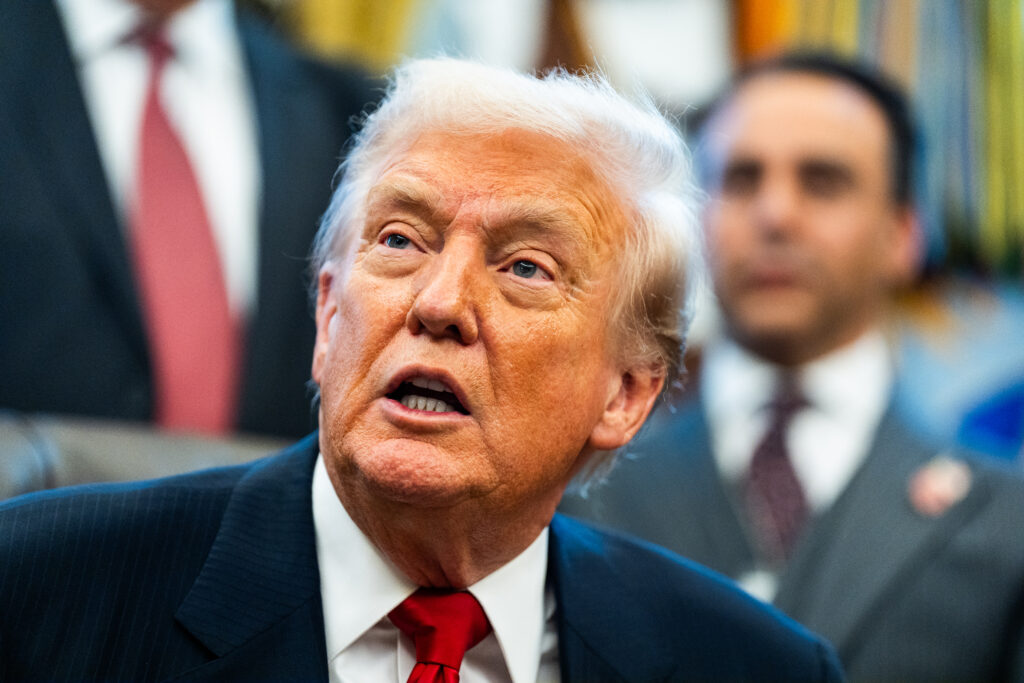President Donald Trump has again promised a “far better and far less expensive” alternative to the Affordable Care Act, and Republicans are rushing — again — to deliver one.
For weeks throughout the longest government shutdown in history, Trump avoided negotiating with Democrats on the health care concerns fueling their standoff. Now lawmakers on both sides of the aisle are speeding toward a self-imposed deadline of mid-December to hold dueling health care votes.
Democrats maintain the simplest and most popular option is to extend ACA subsidies set to expire next month. Analysts say millions of people — many in states that supported Trump — will forgo health insurance if the program ends. The president’s own pollster has warned that not extending the subsidies would pose a major political risk for the GOP in the midterms.
But rather than sign on to Democrats’ proposal, the president has argued instead that billions of dollars in ACA subsidy money should be redirected away from health insurers and toward the general public, potentially in the form of untaxed health-savings accounts.
Many health economists have panned Trump’s plan, saying it is likely to create a “death spiral” in the ACA marketplaces. Healthy people would be prone to drop coverage, using the subsidies to pay out of pocket for whatever limited health care they need, leaving sick people behind and causing premiums to skyrocket.
The scenario smacks of déjà vu — with lawmakers and experts acknowledging the seemingly interminable battle around the 15-year-old health law, Republicans’ long struggle to deliver an ACA alternative that can pass Congress, and the return of a dynamic from Trump’s first term that repeatedly ended in failure.
Any new health care legislation would also face pressure from antiabortion groups, who have long resented how the ACA allows insurers to cover some abortions. Past attempts to craft bipartisan changes to the health law have failed because of fights on whether to apply the Hyde Amendment — long-standing language banning federal funds for abortions except in cases of rape, incest or when the woman’s life is threatened.
Lawmakers now must hash out major decisions in the span of a few weeks — with millions of Americans’ health care, and potentially their own political future, in the balance.
The latest showdown
More than 20 million Americans have benefited from soon-to-expire ACA subsidies initially deployed to lower health insurance costs during the pandemic, and many shoppers are already seeing significant premium hikes.
Democrats extracted a promise to vote on extending the subsidies and other concessions as a condition of ending the 43-day shutdown last week.
The subsidies are politically popular: About three-quarters of Americans say Congress should extend the enhanced tax credits for people who purchase their own insurance through ACA marketplaces, according to polling released this month by KFF, a nonpartisan health care research and polling organization. Half of Republicans also say they support extending the subsidies, a number that is down from 59 percent in September, after the issue became more politicized.
The Congressional Budget Office, a nonpartisan agency, has projected that permanently extending the subsidies would increase the number of insured people by nearly 4 million across the next decade, at a cost of $350 billion to taxpayers.
Meanwhile, some Democrats are already slamming the Trump administration for premium hikes in campaign ads ahead of next year’s midterms.
Wary of the potential backlash, some GOP lawmakers and strategists have cautioned the party to avoid another Obamacare fight. Allies of the president, including his pollster Tony Fabrizio, have also warned Trump about the political backlash of ending the subsidies.
But other conservative lawmakers and experts have dismissed the subsidies as a costly, pandemic-era relic that are overly vulnerable to fraud. They also argue that the expansive subsidies, which are available for people who earn between 100 percent to 400 percent of the federal poverty level, subvert the initial intent of the ACA and have wrongly inflated insurance companies’ profits.
“Just shuttling money to the insurance companies is not going to solve this problem, and it’s never going to end, because it’s always going to be more and more subsidies at greater and greater cost,” said Joe Grogan, who served as Trump’s top domestic policy adviser in the president’s first term.
Trump’s idea: Steer money toward savings accounts
The president, a longtime critic of the ACA, has settled on a plan to redistribute billions of dollars in payments that currently go to health insurers, arguing that redirecting the money to everyday Americans’ savings accounts will give them more control over their decisions.
“They’re gonna go out and buy their own health care, and we’re gonna forget this Obamacare madness,” Trump said in the Oval Office on Wednesday night.
The concept has long been favored by conservatives, who say such accounts give people more control over their health care spending and encourage personal responsibility. The conservative-leaning Paragon Health Institute has issued its own proposal to redirect a portion of ACA subsidies away from health insurers and toward health-savings accounts, which some lawmakers are using as a model.
“The policy would result in lower premiums, lower federal deficits, and more patient control over their own health care — a rare trifecta of wins,” Brian Blase, Paragon’s leader, wrote in a newsletter Thursday.
Sen. Bill Cassidy (R-Louisiana), the chairman of the Senate’s health committee, said in an interview Wednesday that he is planning to hold a hearing in late November to allow lawmakers and experts to discuss policy ideas, including his own push to offer prepaid health accounts to ACA shoppers.
Under Cassidy’s proposal, Congress would redirect the enhanced subsidies into tax-free Flexible Spending Accounts, or FSAs. The health committee chairman has argued that it would be a quick fix because some state officials have already issued premium rates that assume Congress will not extend the subsidies past Dec. 31.
“You can take that same amount of money and get the beneficiary the flexibility to spend it on her deductible, on her co-pay, on orthodontia, on dental work, on eyeglasses,” Cassidy said. “It’s also something that we can get out for the next plan year, independently of how premium rates have been calculated.”
But FSA money generally can’t be used to pay premiums — meaning that patients would be on out on their own when it came to paying the regular monthly costs to stay insured.
FSAs are “great for buying eyeglasses and going to the dentist, but if you have a catastrophic health event they’re not going to help,” said Thomas Buchmueller, a University of Michigan economist who served in the Biden administration.
Cassidy urged Democrats to approach upcoming talks with an open mind, saying that high health care costs are a bipartisan concern.
“My plea is that before you decide to say no, why don’t you listen? And maybe there’s something to which you can say yes,” Cassidy said.
Other ideas: Rebate checks, reinsurance fund
The Trump administration has sought other ways to temper severe premium spikes. In September, the White House Domestic Policy Council asked Peter Nelson, who oversees the Affordable Care Act marketplaces at the Centers for Medicare and Medicaid Services, to come up with a plan for sending rebate checks to marketplace customers, according to two CMS staffers who spoke on the condition of anonymity to discuss internal operations.
Under one version of the plan, which hasn’t been finalized, people who earn too much to qualify for subsidies would be mailed a one-time rebate check, according to a screenshot of the details that were at one point under consideration. CMS would spend up to $300 million on the rebates using fees paid by health insurers that sell plans on Healthcare.gov.
The rebate plans have been tabled at the moment but are still on the roster of possible responses, the people said.
The White House and CMS did not respond to questions about the proposal.
There are also efforts underway in Congress to deliver marketplace rebates. A spokeswoman for Sen. Ron Johnson (R-Wisconsin) said the senator is “reviewing ideas related to marketplace rebates as part of broader efforts to make health care more affordable.”
Avik Roy, chairman of the Foundation for Research on Equal Opportunity, a think tank that promotes free markets, said he has been speaking with GOP lawmakers about his own ideas to overhaul the health law, such as widening the law’s age bands to lower the cost of health insurance for younger and healthier patients, and also creating a $10-billion-per-year reinsurance fund that would directly subsidize premiums for the sick and the chronically ill, as a potential compromise with Democrats.
“Those are two ideas that should really strengthen the ACA, make it more affordable, enable more people to sign up for it, and start to create a functional individual market for health insurance,” Roy said.
Democrats’ push: Just extend the subsidies
Democratic Senate aides, speaking on the condition of anonymity to describe in-progress negotiations, said they are optimistic they can convince enough Republicans to extend the ACA subsidies to ensure its passage. Some Democrats have signaled they are open to some of the GOP demands, such as imposing new income limits and instituting more fraud-prevention, as a compromise.
There could also be a pathway in the House, where Republicans hold a majority. Fourteen GOP members have signed on to a bill by Rep. Jen Kiggans (R-Virginia) to extend the enhanced subsidies for one year. Reps. Don Bacon (R-Nebraska) and Jeff Hurd (R-Colorado) partnered with two Democrats to craft a potential outline for extending the subsidies for two years.
“It’s encouraging to see Republicans finally join the conversation on how to ensure working families can afford their health insurance,” Sen. Jeanne Shaheen (D-New Hampshire), who has spent more than a year calling to extend the soon-to-expire ACA subsidies, said in a statement. “I hope more and more of my colleagues across the aisle will join us to act on one of the most immediate and effective ways to address the cost of living crisis. If not, the American people will know who is responsible for their premiums shooting through the roof.”
Kadia Goba contributed to this report.
The post GOP plans to replace Obamacare have failed. Here’s what lawmakers propose now.
appeared first on Washington Post.




